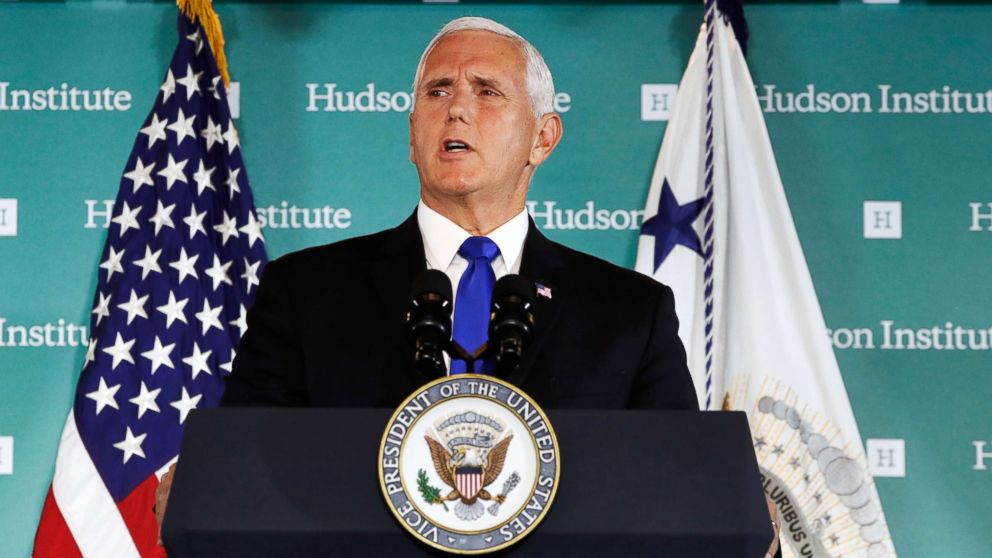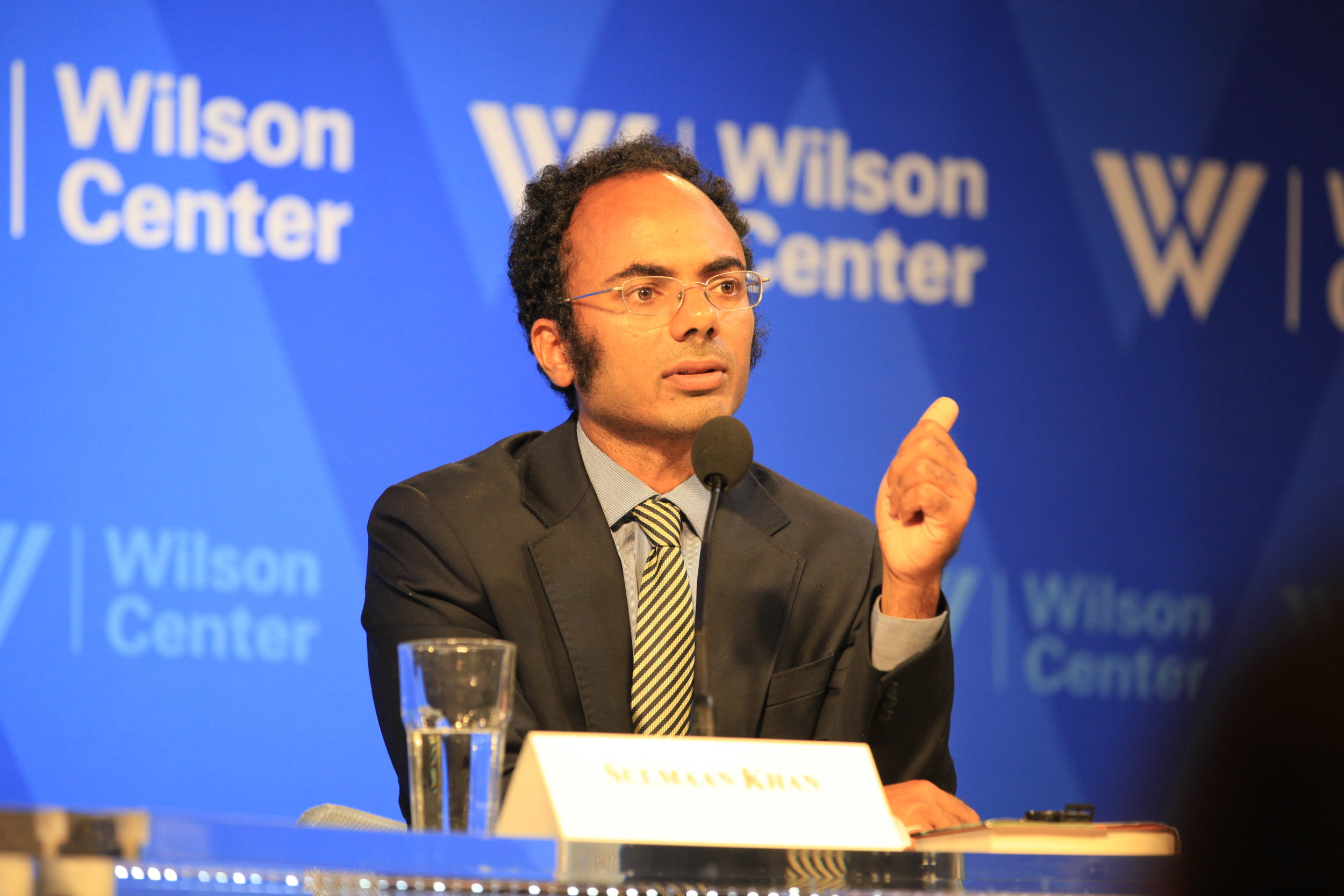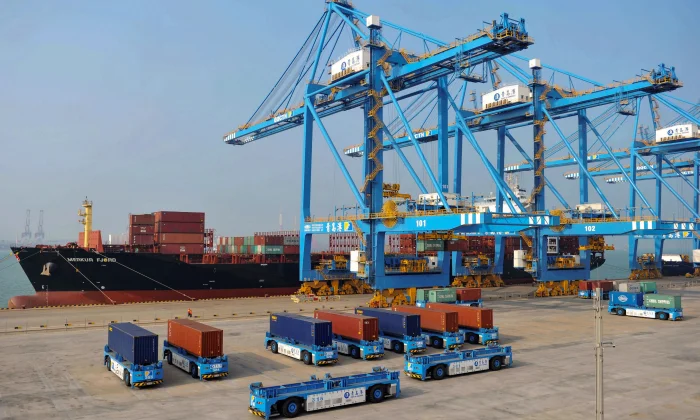Pence Says China Is Meddling in US Democracy, and US Won’t Back Down
Trump administration adopts new approach to China, seeking to end its predatory behavior
October 4, 2018 Updated: October 5, 2018
WASHINGTON—Vice President Mike Pence delivered a strong message: The Chinese Communist Party is employing an unprecedented approach to meddle in the United States’ democracy and to influence public opinion, but President Donald Trump won’t back down because his leadership is working.
In a speech on U.S. policy toward China at the Hudson Institute on Oct. 4, Pence outlined in detail the intensive and sophisticated influence operations of the Chinese Communist Party (CCP) in the United States.
“Beijing is employing a whole-of-government approach, using political, economic, and military tools, as well as propaganda, to advance its influence and benefit its interests in the United States,” Pence said.
“Worst of all, China has initiated an unprecedented effort to influence American public opinion, the 2018 elections, and the environment leading into the 2020 presidential elections,” he said. “To put it bluntly, President Trump’s leadership is working, and China wants a different American president.”
Pence said, “China is targeting U.S. state and local governments and officials to exploit any divisions between federal and local levels on policy. It’s using issues, like trade tariffs, to advance Beijing’s political influence.”
“Beijing has also mobilized covert actors, front groups, and propaganda outlets to shift Americans’ perception of Chinese policies,” he said.
Other means include trying to influence business leaders and American voters directly.
“You need only look at Beijing’s tariffs in response to ours. They specifically targeted industries and states that would play an important role in the 2018 election. By one estimate, more than 80 percent of U.S. counties targeted by China voted for President Trump in 2016; now, China wants to turn these voters against our administration,” Pence said.
Pence also mentioned a multi-page supplement in the Des Moines, Iowa, Register that was financed by the Chinese government as an example of Beijing’s attempts to directly appeal to U.S. voters.
New Approach to China
Pence said that previous administrations all but ignored China’s actions—and in many cases, they abetted them. “But those days are over,” and the Trump administration has adopted a new approach.
“We seek a relationship grounded in fairness, reciprocity, and respect for sovereignty, and we have taken strong and swift action to achieve that goal. ”
The United States’ new approach, Pence said, includes making the strongest military in the history of the world stronger still, implementing tariffs specifically targeting the advanced industries that Beijing is trying to capture and control, giving a stronger commitment to a free and open Indo-Pacific, forging new trade deals, streamlining international development and finance programs, and giving foreign nations a just and transparent alternative to China’s debt-trap diplomacy.
Pence said that he would travel to Singapore and Papua New Guinea next month to represent the United States at ASEAN and APEC, and would unveil new measures and programs to support a free and open Indo-Pacific on behalf of the president.
One of those programs is the BUILD Act, which will Trump will soon sign into law. The act provides the means for private enterprise to contribute to the development of low- and lower-middle-income countries. That’s partially in response to China’s One Belt One Road initiative, which has given the Beijing regime influence in the Pacific, South Asia, and Africa.
“To protect our interests here at home, we’ve strengthened CFIUS—the Committee on Foreign Investment in the United States—heightening our scrutiny of Chinese investment in America, to protect our national security from Beijing’s predatory actions.”
Pence said to counter Beijing’s malign influence and interference in U.S. politics and policy, the United States “will continue to expose it, no matter the form it takes.“
He also encouraged more journalists to report the truth without fear or favor, and dig deep “to find where China is interfering in our society, and why—and we hope that more American, and global, news organizations will join in this effort.”
US ‘Rebuilt China’ With Unfulfilled Hope
Pence said that the United States once hoped that “economic liberalization would bring China into greater partnership with us and with the world.”
“After the fall of the Soviet Union, we assumed that a free China was inevitable. Heady with optimism, at the turn of the 21st century, America agreed to give Beijing open access to our economy, and bring China into the World Trade Organization.”
With this optimism, the United States “rebuilt China.”
“Over the past 17 years, China’s GDP has grown 9-fold; it has become the second-largest economy in the world. Much of this success was driven by American investment in China,” Pence said.
“And the Chinese Communist Party has also used an arsenal of policies inconsistent with free and fair trade, including tariffs, quotas, currency manipulation, forced technology transfer, intellectual property theft, and industrial subsidies doled out like candy, to name a few. These policies have built Beijing’s manufacturing base, at the expense of its competitors, especially the United States.
“Now, through the ‘Made in China 2025’ plan, the Communist Party has set its sights on controlling 90 percent of the world’s most advanced industries, including robotics, biotechnology, and artificial intelligence. To win the commanding heights of the 21st Century economy, Beijing has directed its bureaucrats and businesses to obtain American intellectual property—the foundation of our economic leadership—by any means necessary,” he said.
Pence said that under Trump’s leadership, the United States has been defending its national interests with renewed strength. Pence expressed the hope that U.S. companies will follow suit to defend their intellectual property, and not to abet Beijing’s oppression.
Pence said that the U.S. actions have had a major impact. China’s largest stock exchange fell by 25 percent in the first nine months of this year.
Religious Freedom
Pence highlighted religious freedom in his speech, and expressed his deep concerns over the CCP’s crackdowns on Chinese Christians, Buddhists, and Muslims, as “a country that oppresses its own people rarely stops there.”
“Last month, Beijing shut down one of China’s largest underground churches. Across the country, authorities are tearing down crosses, burning Bibles, and imprisoning believers. And Beijing has now reached a deal with the Vatican that gives the avowedly atheist Communist Party a direct role in appointing Catholic bishops. For China’s Christians, these are desperate times.”
Taiwan’s Democracy
Pence sharply criticized Beijing’s coercive behavior against Taiwan—including convincing three Latin American nations to sever ties with Taipei and recognize Beijing—and also forcing U. S. companies to change how they depict Taiwan.
“While our administration will continue to respect the One China Policy, as reflected in the three joint communiques and the Taiwan Relations Act, America will always believe Taiwan’s embrace of democracy shows a better path for all the Chinese people,” Pence said.
History and Future
When giving a brief review of the history of U.S.-China relations, Pence emphasized that the United States had never played any negative part in China’s so-called “Century of Humiliation.” Instead, the United States fought together with China against imperialism during World War II, and “in that war’s aftermath, America ensured that China became a charter member of the United Nations.”
“But soon after it took power in 1949, the Chinese Communist Party began to pursue authoritarian expansionism. Only five years after our nations had fought together, we fought each other,” Pence said.
Pence encouraged China’s rulers to change course.
“As our national security strategy states: ‘Competition does not always mean hostility.’ As President Trump has made clear, we want a constructive relationship with Beijing, where our prosperity and security grow together, not apart. While Beijing has been moving further away from this vision, China’s rulers can still change course, and return to the spirit of ‘reform and opening’ and greater freedom.
“The American people want nothing more; the Chinese people deserve nothing less,“ Pence said.





